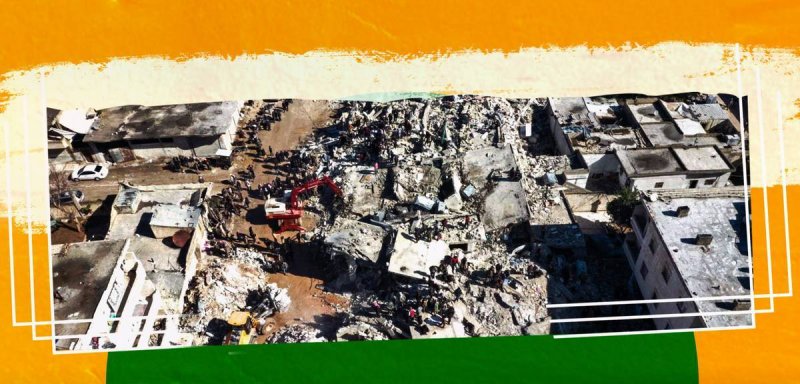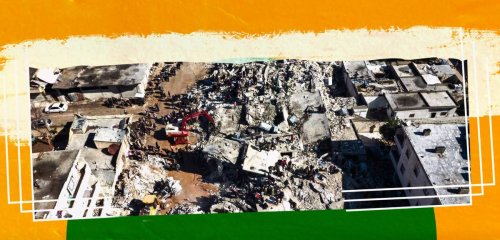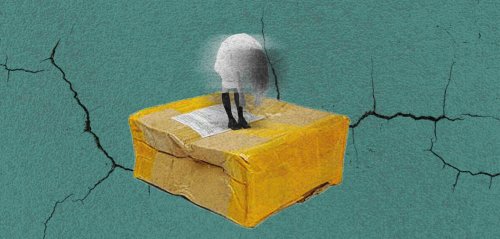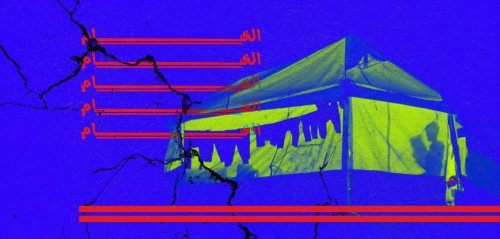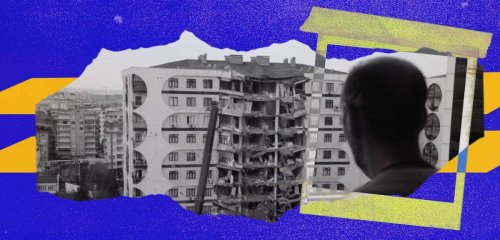"Even the sounds of pained moans and whimpers died out. That sound, which went from a source of pain and sadness, into a symphony of survival, faded away with the inaction of governments and the damned international community that used to say they were friends of the Syrian people, the same international community that has smothered us with talk and no action." With these words, Khaled al-Afrini (44) begins telling his story to Raseef22, of the earthquake disaster that ended life in Jindires.
Khaled was awake that night, working on some papers when he felt the ground shaking around him. He didn't think much, the sounds of his children crying were enough for him to rush to them and his wife to run outside. "Everything is over. Everything I've earned all my life is gone. I am now in a tent with a number of men in the olive groves, and the women are with their children in nearby tents," he says.
After the earthquake, their panicked escape, and making sure his family was alright, Khaled went back to the city, to witness the horror of the destruction in the early hours of the morning. He wandered through the rubble, as there was nothing that hadn't been fallen to ruin. What he saw in the morning was nothing like what he had experienced during the moments of escape. "Jindires now looks like the apocalypse itself," he says.
"Jindires now looks like the apocalypse itself.. Its buildings have been demolished, its residents have been killed. Most streets, landmarks and neighborhoods no longer have a trace. The memories of the region were buried with those who were buried in it”
Khaled quotes Ibrahim Khalil, a sixty-year-old man he met in the city yesterday, as "the only survivor of a family that – seconds before the earthquake – had consisted of 7 members, all of whom left and were laid to rest, while I am left alone to live in sadness and pain. They are the survivors and I am stuck with the filth of this life."
Jindires is located 80 kilometers from the city of Aleppo from the northwest side, at the southern end of the Jabal al-Akrad range in a fertile plain on the northern bank of the Afrin River. It belongs to the predominantly Kurdish Afrin region. The city was massively and severely destroyed by the earthquake that struck Turkey and Syria on February 6.
The Civil Defense said that the number of deaths exceeded 513 people, and the city suffered the largest number of destroyed buildings, with over 200 completely demolished buildings and 500 partially destroyed buildings
The Syrian Civil Defense said in a press conference last Friday that the number of deaths exceeded 513 people, and the city suffered the largest number of destroyed buildings, with over 200 completely demolished buildings and 500 partially destroyed buildings.
No words enough to describe the disaster
Mustafa Khaled, or Abu Caesar, 62, cannot find words that do justice to the disaster. Within seconds, he found himself in the street with his children in his lap. He says, "By God, I don't even remember going down the stairs. Jindires is fully and completely afflicted. Residents gathered with the early morning light, women, men and children, where the cold, the devastation, and the dust turned into mud on our faces from the rain. More than 90% of the multi-storey apartments were demolished. People then began to dig up and search for their relatives as there was no heavy machinery or outside rescue teams. Only the civil defense teams were working, but human hands could not turn into huge devices for breaking stone and cement. The people of Jindires died because no one came to rescue them or gave those teams what the rescue work required."
Nadia Ali, 33, recounts how her sister lost her ability to speak from the shock and trauma, and she doesn't know if she’ll be able to speak again, "Whoever was not lost to the earthquake, we’re afraid to lose from hunger, cold, and fear. We didn’t find any organization that provided support. All the elderly need heart and blood pressure medications. The children have no diapers. We are living like animals in the wild. My uncle's entire family is under the rubble, and my other uncle only found his wife among the survivors and there’s no information about the rest."
She adds, "Those who did not die from the earthquake will die from the lack of medicines. Some children are still in shock and are wetting their beds out of fear, in addition to the mental illnesses and nightmares that haunt the majority of survivors, or those who were pulled out from under the rubble, and those who carried out rescue operations.”
"I'm the only survivor of a family that – seconds before the earthquake – had consisted of 7 members. They all left and laid to rest under the rubble, while I'm left alone in sadness and pain. They're the survivors and I'm stuck in the filth of this life"
The thirty-something woman tells of how children are asking questions like, "Why didn't God save us?" and "Where is my father who said he would be with me in all the adversities?" She then pauses and says that, "The most painful question was when one of the children asked his father: ‘Are you going to remarry because my mother is dead? I want to live alongside my mother in her grave’.”
Jindires throughout history
Kurdish writer and researcher Marwan Barakat, who has been displaced from Jindires, recounts that "the city is located between the two most important archaeological sites in the region, Antioch (the ancient Hellenistic city) on the southwestern side, and the city of Cyrrhus (present-day Nebi Houri) on the northeastern side. On the southeastern and eastern side of the Jindires border, there are dozens of important archaeological sites, such as the Qala'at Samaan (Fortress and Cathedral of St. Simeon) and the ancient temple of Tell Ain Dara. Meanwhile on the southeastern side is the summit of Mount Sheikh Barakat, while the Dodariya Cave is located to the southeast of the city and is perhaps one of the most important places where Neanderthals settled in Syria more than a hundred thousand years ago.”
Jindires was at the height of its prosperity during the Roman period, and this is confirmed by the treasure trove of silver coins and luxurious cooking utensils found in it
The researcher states that "the reports of the excavation mission at the site of Jindires confirm that it was at the height of its prosperity during the Roman period, and what confirms this theory during the Middle Roman era, is the treasure trove of silver coins and luxury cooking utensils that were found at the site, as well as the sophisticated glass finds that date back to the Roman era."
The city was carrying out an agricultural function such as cultivating grain, in order to participate in supplying Antioch with this basic need, because its vast and fertile plain lands were well suited for grain cultivation. Besides cereals and grains, its agriculture included grapes and some types of fruits.
Jindires today
The demographic composition of the region changed a lot during the years of the war, "after the vast majority of its population had been mostly Kurds, it witnessed a major demographic change, especially during the military operation known as Olive Branch, where large numbers of displaced people and military factions settled."
Those who visit the city discover that "its features have completely changed; its buildings have been demolished, its residents have been killed, its streets, neighborhoods, markets, landmarks and roads have all changed and most of them no longer have a trace, and before all this, the memories of the region were buried with those who were buried in it.”
"Men, women and children gathered with the early morning light to dig up their relatives as there was no heavy machinery or outside rescue teams. The people of Jindires died because no one came to rescue them or gave them what the rescue work required"
Mohammed Hajo, 65, who spent his entire life in the city, recounts, "Jindires has become a relic. It doesn’t exist. The main streets, restaurants, shops, parks and schools, were either destroyed by the earthquake, their features have completely changed, or they need new ways to reach them. The town is covered in devastation, blood, and ruin. The buildings have turned into rubble. There’s no electricity, water or internet, and those who have been able to take refuge in tents are no less miserable than those who could not get one."
He adds, "I no longer know which roads lead to where. All of them, even though I have long ago memorized the roads and alleys of the town by heart. I do not know how to get to the archaeological centers or places of worship. Where are the apartments and houses that were present before the earthquake? Most of my childhood friends are gone. All the memories are gone. There is no one left who shares my memories and no places that will return to me and all of us as the people of Jindires, our past and our history. The city has been removed from existence, and it needs to be rebuilt, who will build it for us?"
Raseef22 is a not for profit entity. Our focus is on quality journalism. Every contribution to the NasRaseef membership goes directly towards journalism production. We stand independent, not accepting corporate sponsorships, sponsored content or political funding.
Support our mission to keep Raseef22 available to all readers by clicking here!
Interested in writing with us? Check our pitch process here!
